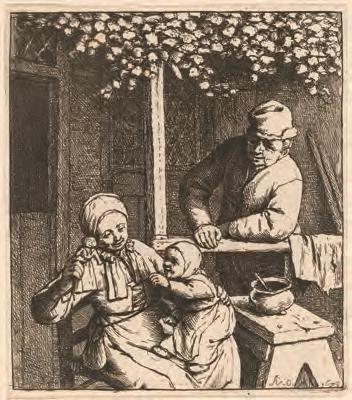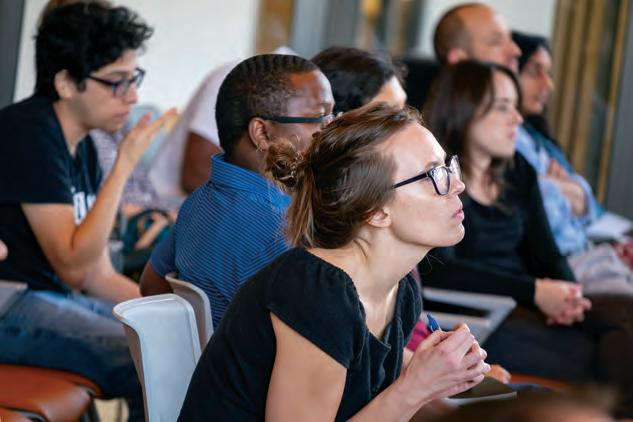
8 minute read
Scholary Writing Retreat
Acting Director Ignacio Infante determined that this was a moment that required more structure and support than usual. Together with Shefali Chandra, associate professor of history and interim associate director of the humanities center, and with the help of Caroline Kita, associate professor of German, and Zoe Stamatopoulou, associate professor of classics, the four planned a Scholarly Writing Retreat like none held before.
Writing retreat participants, more than 50 in number, began each day with a daily prompt email — a no-wrong-answer conversation starter on topics from the silly to the sublime. Participants were divided into common-interest writing groups based on the type of writing they were tackling this summer — from dissertations to book chapters — and the groups met via Zoom daily to check in and discuss their writing projects. Most often, they held “quiet Zooms,” during which participants would join a Zoom call and work on their own writing while muted, providing the daily schedule and realtime accountability that made earlier in-person writing retreats so successful. To provide the opportunity for socializing, two daily drop-in coffee breaks gave them the chance to chat about the daily prompt, to catch up or just to hang out with some new faces.
Advertisement
Tips for Cultivating a Successful Writing Practice

• Set “soft deadlines” in between your big deadlines — use conferences or exchanging work with colleagues to help you develop ideas for articles or other big projects.
• Create a calendar or schedule for writing.
• Only revise the last paragraph you wrote (to keep yourself from getting caught in the revision trap).
• Set a word count goal per day.
• Do “work sprints” or the Pomodoro method.
• Use browser shutdown software (like Freedom) to keep yourself from getting distracted by other websites, news or social media.
• Share your writing with others and get feedback.
• Prioritize your work — write before you check email or write letters of recommendation or reviews.
• Use old notes as a prompt to start writing.
• Start with short writing goals (5 minutes, no distraction), increase by small increments until you can write for an hour without a break.
• Change your location during the day — try writing in a different space.
• Use an app (like Forest or Lightdogs) to help motivate your writing and keep you from checking your phone too much!
Thanks to the participants in Caroline Kita’s writing group for sharing the list of writing tips they collected during the Scholarly Writing Retreat.
Children’s Studies
Amy Pawl, Teaching Professor of English; and Desirée White, Professor of Psychological and Brain Sciences; Co-Directors
In the Children’s Studies minor, students learn about children and childhood while drawing on the expertise of faculty from across Washington University. Minors develop a sophisticated interdisciplinary understanding of childhood and the issues surrounding the treatment and status of children throughout history. A minor in Children’s Studies exposes students to an interconnected set of ideas about children as objects and subjects in a variety of essential disciplines. It combines social science courses that measure and analyze how children mature and how institutions have affected children with courses in the humanities that examine how children are portrayed and constructed in art, literature and film. Accordingly, the minor draws students with majors, among others, in education, psychology, English, history and American culture studies, or students whose career plans include child-oriented specialties such as family law or pediatric medicine.
In early March 2020, the interdisciplinary nature of the minor was showcased during an evening event at which students from the Children’s Studies Senior Seminar gave public presentations on their experiences. The audience learned about child-focused research the presenters had conducted on such timely topics as immigration, race, health-care access, disability and literacy. Presenters also stressed that interests developed from course work for the minor often guided the volunteer and internship choices they made; for instance, a course on investigating the school-toprison pipeline led one student to become a mentor at her local juvenile detention center.
Other students observed that they found themselves putting children at the center of self-designed projects even in seemingly unrelated classes. Senior Liz Murphy, for example, elected to curate an exhibit for an art history class that focused on representations of child-rearing — both positive and negative — in Dutch Golden Age art.

A second evening gathering, planned for late March, required that students display more than the usual amount of adaptability, as campus classes and events went remote. Fortunately, Children’s Studies minors are used to crossing boundaries, and they navigated the shift from actual to virtual with energy and creativity!

Medical Humanities
Corinna Treitel, Director and Professor of History
The Medical Humanities minor approaches health, disease and medical care as culturally embedded human experiences that vary across time and place. In addition to exploring health, disease and medical care as core human experiences, the program of study is designed to provide a solid grounding in the textual-historical approach essential to all humanities scholarship.
The minor continued to grow and flourish in 2019–20 academic year, despite the disruption of COVID-19. Twelve seniors — the minor’s biggest class ever — graduated in May. Congratulations to the Class of 2020: Kiegan Baranski, Andy Benckendorff, Courtney Benion, Keaira Clancy, Alexa Gault, Clara Henkes, Lauren Hucko, Brennan Kandalaft, Christy Lindberg, Olivia Murray, Maddie Nelson and Rinat Tal!
The year kicked off with a new course, What is Medical Humanities?, that considers medical humanities on a global stage. Students wrote part of the syllabus themselves with the explicit aim of globalizing the Medical Humanities minor and completed proposals for advanced research projects that covered American, European, African and South Asian topics.
The panel discussion “Leveraging the Medical Humanities Minor” was held in the fall semester, featuring former minor Skyler Kessler, Class of 2018, pre-health dean Carolyn Herman and Career Center adviser Amy Heath-Carpentier. Kessler spoke about integrating his medical humanities interests into his applications for medical school and advised students on how to keep those studies alive while becoming a physician (see sidebar). Later, students in the minor gathered to watch the documentary End Game about end-of-life care, followed by discussion with Anya Plutynski, associate professor of philosophy.
ALUMNI SPOTLIGHT: Skyler Kessler
Skyler Kessler, who graduated with a minor in Medical Humanities in 2018, just finished his second year of course work at the Washington University School of Medicine. He has long demonstrated interest in a career in the medical profession, first as a young participant in the junior fire department in New York and then as a full member of the rescue squad as a licensed EMT after he turned 18. He says, “From that point on, I really knew that I wanted to go into medicine.”
After his first two years at Washington University, devoted mainly to pre-med curriculum, he began to feel a little burned out and wanted to try something new. He explains that he decided to try the medical humanities because he “was kind of afraid of the humanities and I wanted to challenge myself and kind of get out of the bubble of the basic science courses.” Today, he credits the medical humanities with giving him a unique perspective that he believes will help him to be a better physician. While his biology studies may have helped him understand the individual functions of body parts, he believes doctors need a bit of the humanities to understand the broader picture, arguing, “It is really important not to judge people and do your best to treat them as a whole patient and not like a conglomeration of organ systems.”

Giving Opportunities
The Center for the Humanities is dedicated to the promotion of humanistic thinking, inquiry and scholarly production as activities essential to this university, the community we serve and the broader world. The center facilitates the work of humanists, both faculty and students, by nurturing innovative research, transformative pedagogy and vibrant community engagement locally and globally.
Please take part in helping us to expand and deepen the reach of the humanities and the important contributions our center achieves. The Center for the Humanities asks for your support in promoting our mission at Washington University as well as in our local community and around the world.
How You Can Help
Your support enables vital humanities research and the dissemination of new findings, scholarly exchanges, student research experiences and engagement with the greater public.
$1.25 million endowment will permanently support the entire Faculty Fellowship program; $200,000 will endow one Faculty Fellowship.
$1 million will endow one postdoctoral fellow in residence at the humanities center; $90,000 will support a postdoctoral fellow for one year.
$600,000 will endow the entire Graduate Student Fellowship program; $30,000 will support the entire program for one year.
$300,000 will permanently endow a Visiting Scholar program, allowing for an extended visit each year by a new highprofile scholar.
$200,000 will permanently endow the annual James E. McLeod Memorial Lecture on Higher Education.
$15,000 provides funding for the Kling Undergraduate Honors Research Fellowship program for one year.
$15,000 will fund the publication of the Humanities Broadsheet for a full academic year.
$5,000 will fund a First Book Workshop for one of our Faculty Fellows.
$1,000 will provide flexible funding and qualify you for membership in the William Greenleaf Eliot Society.
Gifts of any amount provide vital, ongoing support.
To make a gift in support of the Center for the Humanities, please contact Director and Professor Jean Allman (314-935-5576 or jallman@wustl.edu) or Senior Director of Development Deborah Stine (314-935-7377 or deborah_stine@wustl.edu).
Make A Gift Online
To make a secure online gift or to make payment on an existing pledge, go to our giving page at gifts.wustl.edu. To designate your gift, type “Center for the Humanities” in the special designation box.
Make A Gift Or Pledge By Mail
To make a gift by mail, please include an explanation of the purpose for your gift and a check made payable to Washington University. Send to: Washington University in St. Louis, Alumni and Development Programs, Attn: Deborah Stine, One Brookings Drive, Campus Box 1202, St. Louis, MO 63130.
1, 5, 6 / Honoring the work of Washington University’s humanities scholars at the Faculty Book Celebration.
2 / Connecting audiences and thought leaders at the annual James E. McLeod Lecture on Higher Education.
3 / Developing new capacities among our faculty with Redefining Doctoral Education in the Humanities (RDE).
4 / Spearheading a multidisciplinary and multi-institutional initiative to focus on segregation in St. Louis and beyond via The Divided City.






Administrative staff
Jean Allman
Director, Center for the Humanities Professor, Department of African and African-American Studies
J.H. Hexter Professor in the Humanities, with appointments in History and Women, Gender and Sexuality Studies
On leave 2019–20
Ignacio Infante
Acting Director, Center for the Humanities Associate Professor, Comparative Literature and Romance Languages and Literatures
Shefali Chandra
Interim Associate Director, Center for the Humanities
Associate Professor, History
Wendy Love Anderson
Assistant Director of Academic Programs
Kathleen G. Fields
Publications and Communications Editor
Barbara Liebmann
Administrative Coordinator
Tila Neguse
Coordinator, Divided City Initiative
Trisha Sutton
Administrative Cluster Supervisor
We thank Kathy Daniel for her service as the humanities center’s contract and grant coordinator from March 2016 to August 2019
Executive committee
William Acree | Associate Professor of Spanish
Monique Bedasse | Associate Professor of History
Colin Burnett | Associate Professor of Film and Media Studies
Rebecca Copeland | Professor of Japanese Language and Literature
Matt Erlin | Professor of German
Kristina Kleutghen | David W. Mesker Associate Professor of Art History
Melanie Micir | Assistant Professor of English
Zoe Stamatopoulou | Associate Professor of Classics
Rafia Zafar | Professor of English
(314) 935-5576
Umrath cenhum@wustl.edu humanities.wustl.edu facebook.com/WashUHumanities twitter.com/WashUHumanities

